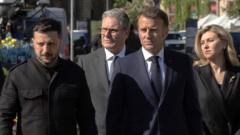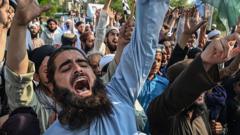In a rare development in the Congo-Rwanda crisis, the Democratic Republic of Congo has agreed to a ceasefire with the M23 militia, countering previous stances against negotiations.
Congo and M23 Announce Ceasefire Agreement Amid Ongoing Conflict

Congo and M23 Announce Ceasefire Agreement Amid Ongoing Conflict
The Democratic Republic of Congo and the M23 militia have reached a surprising ceasefire agreement, marking a potential turning point in their long-standing conflict.
In a joint statement released late Wednesday, the Democratic Republic of Congo (DRC) and the Rwanda-backed M23 militia announced their commitment to halting hostilities along the two nations' border, a conflict that has seen escalating violence since January. This unexpected agreement comes from DRC President Felix Tshisekedi, who previously maintained a hardline stance against negotiations with M23, accusing it of occupying significant territories rich in critical minerals.
The joint statement emphasized both sides' “commitment to an immediate cessation of hostilities,” a breakthrough that Fred Bauma, the executive director of Congolese research institute Ebuteli, deemed "unprecedented." This marks a shift for Tshisekedi, who has insisted on negotiating only with Rwanda directly.
The United States and United Nations have alleged that Rwanda is financially supporting and directing the M23 operations, claims that Rwanda has rebuffed. This ceasefire agreement arises amidst a protracted conflict with deep historical roots, stemming from crises during the mid-1990s when the Rwandan genocide led to mass migrations into Congo, inciting two wars that resulted in approximately six million deaths, according to U.N. estimates.
The announcement of the ceasefire has brought a glimmer of hope, showcasing a potential pathway towards peace amid persistent violence affecting countless lives in the region. As both parties work towards a lasting peace agreement, observers will be keenly watching the developments in this war-torn area.
The joint statement emphasized both sides' “commitment to an immediate cessation of hostilities,” a breakthrough that Fred Bauma, the executive director of Congolese research institute Ebuteli, deemed "unprecedented." This marks a shift for Tshisekedi, who has insisted on negotiating only with Rwanda directly.
The United States and United Nations have alleged that Rwanda is financially supporting and directing the M23 operations, claims that Rwanda has rebuffed. This ceasefire agreement arises amidst a protracted conflict with deep historical roots, stemming from crises during the mid-1990s when the Rwandan genocide led to mass migrations into Congo, inciting two wars that resulted in approximately six million deaths, according to U.N. estimates.
The announcement of the ceasefire has brought a glimmer of hope, showcasing a potential pathway towards peace amid persistent violence affecting countless lives in the region. As both parties work towards a lasting peace agreement, observers will be keenly watching the developments in this war-torn area.



















